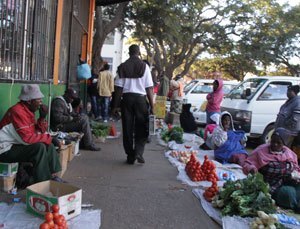
INFORMAL traders have reacted angrily to plans by the Harare City Council to get rid of vendors and illegal structures in the city saying the move would destroy the livelihoods of several thousands of people.
REPORT BY CHRISTOPHER MAHOVE
The Harare City Council recently announced that it was going to get rid of vendors and pull down illegal structures to keep the city clean and prevent the outbreak of diseases.
Vendors who sell wares and food almost everywhere in the city have in the past been blamed for the outbreak of diseases such as typhoid and cholera.
But vendors who spoke to Standardcommunity last week said banning vending in the city would condemn them into destitution as it would destroy their source of livelihood, making them incapable of sustaining their families.
A vendor, who only identified herself as Mai Lorraine and operates in Harare’s central business district, said council was not being considerate as vending was sustaining a number of families in the city.
She said apart from vending being a source of livelihood to many people, vendors also contributed significantly to council revenue in the form of rentals.
“Most of the people who rent houses in Harare are in the informal sector and are therefore, contributing the bulk of the revenue to the city, yet they want to harass us,” she said. “They are not only driving us into poverty, but they are also negatively affecting their revenue collection.”
- Harare cancels Pomona waste deal
- Devolution gains remain a mirage
- Harare cancels Pomona waste deal
- Pomona saga: Harare handed shock US$750k ‘garbage’ bill
Keep Reading
The council collects rentals from vendors who operate in designated places both in the CBD and suburban areas. Another vendor, Albert Mukwati said council was starting a “war” it would never win as a lot of people in Harare were surviving on informal trading.
With an 80% unemployment rate in the country, the majority of Zimbabweans have resorted to informal trading for a living.
“Council must not try to start a war by harassing us and preventing us from fending for our families because they will not win it,” he said. “People will have nowhere to go and will obviously react; and authorities would then think that people are pushing a political agenda, when in fact, it is a bread and butter issue.”
Zimbabwe Chamber of Informal Economy Association (ZCIEA) secretary general Lisborn Malaya said the city fathers were being inconsiderate to the plight of the traders.
He said most of people were forced into illegal vending because of the scarcity of jobs in the country.
Malaya said the move was not different from the 2005 Operation Murambatsvina, which left over 250 000 people’s homes and property destroyed while over 700 000 people were internally displaced.
“It is quite a strong declaration whose effects will be the same as that of Murambatsvina,” said Malaya. “We are actually on our way to engage council on the matter. We want to find out what their problem is. If it is about littering and the environment, then they must provide designated areas where there will be enough facilities.”
He added: “The effect is that they will increase poverty instead of reducing it. If they go ahead, they will be taking away the vendors’ only source of livelihood. Most of these people are widows and single mothers and this will have ripple effects as they have children to look after.”
Malaya said the council should stop harassing vendors and other informal traders if they did not have a fallback plan.
“They should give them [vendors] jobs or create an environment where they [informal traders] will be regularised. They [council officials] are doing this because they have jobs; they have houses and food on their table,” he said. Council is the regulating authority—Mutizwa
Harare City’s environment committee chairman, Stewart Mutizwa said the decision was reached because of genuine fear of an outbreak of diseases associated with rain such as cholera and typhoid.
“We would not want council to be in the same predicament as in 2008 where we lost nearly 4 000 lives because of cholera,” he said. “All the food handlers must be properly certified.
“We are encouraging people to use our offices and apply for whatever they want to do and our offices will allocate designated places to those people.”
Mutizwa said there was need to limit and regulate the number of vendors operating in the city.











